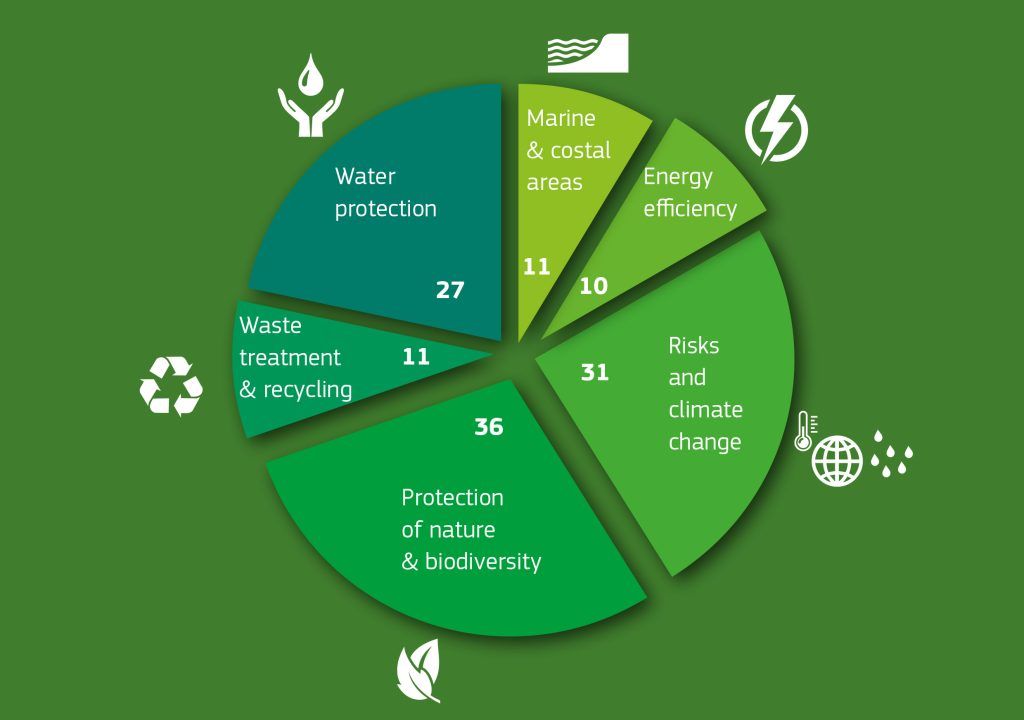Protecting our common home in 126 moves (so far)
We adapt building technology to save energy. We turn organic waste into compost. We monitor rivers to increase awareness of pollution… The ENI CBC family is heavily involved in the protection of environment: over one hundred projects are already running full speed.
Since its beginning, the cooperation across the external borders of the European Union has taken this crucial challenge at heart: today 12 ENI CBC programmes are working from Tallinn to Tunis, from Stockholm to Kiev, financing 126 projects (out of a total of 560) at present implementing activities in the field. And it is a number bound to grow.
Because the planet is one, and we all share it, as good neighbours do with the building they live in. We are all aware of the excessive exploitation of natural resources, of the pollution, of the climate change issue: ENI CBC programmes have chosen to work on several aspects of the global environmental battle. They have devoted so far to this fight 173 million EUR, which is 22% of the total EU contribution of 785 million EUR.
The protection of nature and biodiversity is the most popular sector within our community (36 projects approved so far), especially for programmes like Kolarctic and Karelia. Actions span from the sustainable use of natural resources to the protection of ecosystems: just as an example, projects restore populations of fishes decreased (or disappeared) because of illegal fishing or pollution. The second sector in the preference list is the environmental risk and climate change adaptation (31 projects), slightly favoured by Baltic and European countries: examples of adaptation measures include using scarce water resources more efficiently, or choosing tree species and forestry practices less vulnerable to storms and fires. Or even developing new tools to manage water storms, to minimise the discharge of dangerous substances from urban areas to fresh water sources.
Water protection is also very high on the list (27 projects): activities involve a wide range of categories, from the alleviation of pollution of ground water to the introduction of new irrigation practices or new technologies to filter waters. As an example, new river monitoring techniques have been introduced by programmes, involving citizens: because the populations close to natural resources are bound to mostly care about them.
The next three groups are all close together in the appreciation of our programmes: waste treatment and recycling (11 projects) involves the use of improved technology to recycle waste, as well as the revitalisation of polluted areas. Waste management is a crucial issue, also for what concerns marine and costal littering. Just as example, one of our projects is turning the organic waste produced by heavily touristic areas into compost, to be used for agricultural purposes… Marine and costal areas management (also 11 projects so far, not surprisingly appreciated by Black Sea Basin and Southern Programmes, deals for a good part with the cleaning up of marine debris: as United Nations’ reports show, millions of tons of garbage reach the marine environment every year. Fatih Konukcu – from the Namik Kemal University in Turkey – explains in an article on this same edition of our bulletin, that marine litter comes from land-based sources: inadequate solid waste management is a major driver to generate it, therefore it is important to know where the pollution comes from to address the root causes of problems. Last – but not least – energy efficiency (10 projects so far): in this sector projects deal with promotion of solar and hydro energy, with environmentally friendly transport, with new construction technologies. In the North, scientists and technicians are joining forces to develop new ice-resistant materials, or energy-saving construction techniques.
Other horizontal aspects such as awareness, capacity building and monitoring activities, are integrated in the project strategies. So, from the Baltic to the Mediterranean Sea, it is fair to say that the ENI CBC community is working in a variety of directions to tackle environmental problems and to explore solutions.
Come and join us in Brussels during the EURegionsWeek (on Thursday, October 10, at 11:00) to bring your experience, to share your views: we will discuss which tools work better to create more conscious citizens, and how results achieved during awareness campaigns can be sustainable. Because all we look for is a sustainable future for the next generations. And we do it together: because neighbours share the same home.
